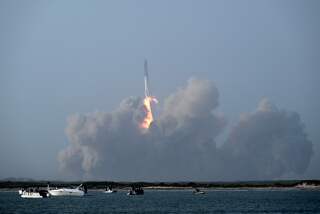1st U.S. Private Satellite Rocket Lofts Payload
- Share via
KENNEDY SPACE CENTER, Fla. — The first U.S. commercial satellite rocket was launched Sunday, propelling a $150-million British communications payload into orbit.
The three-stage Delta booster, built by McDonnell Douglas Corp., left a fiery trail in a clear sky as it sped out over the Atlantic Ocean with the 2,700-pound Marcopolo 1 satellite packed in its nose cone.
“Delta 187 has placed the British Satellite Broadcasting satellite in orbit; we wish the spacecraft folks good luck,” McDonnell Douglas launch commentator Ray Adams reported 30 minutes after liftoff.
Adams said the $30-million Delta had done its job and drilled the satellite into an initial highly elliptical orbit ranging from about 100 to 22,300 miles high.
On Tuesday, ground controllers plan to send a signal to fire an on-board motor to arrest the satellite in a geostationary orbit at 22,300 miles, parking it over the middle Atlantic Ocean within view of the British Isles.
Post-Challenger Program
The successful launch was an important milestone in a commercial space program started when former President Ronald Reagan told the National Aeronautics and Space Administration to stop launching payloads for commercial customers after the space shuttle Challenger exploded in January, 1986. Reagan said that the job should be done by private industry with unmanned rockets.
One reason for Reagan’s decision was the nation’s growing reliance on the manned space shuttle as the sole booster for space payloads.
“This is not just another launch; it’s the beginning of a new industry, a landmark event,” said Stephanie Lee-Miller of the Department of Transportation, which licenses commercial launches. There are 30 such launches on the DOT manifest in the next few years, she said at a news conference.
Marcopolo 1 is the first of two satellites designed to transmit television programs direct to British homes equipped with a 12-inch-diameter antenna, a set-top box and a remote control unit.
Three Competing U.S. Firms
Three major U.S. aerospace companies took on the commercial space program in earnest, and the McDonnell Douglas Delta was the first to the launch pad. Martin Marietta has scheduled a commercial launch with its Titan rocket later this year, and the General Dynamics Atlas is set to make its debut next year.
All three rockets are upgraded versions of boosters NASA and the Air Force have used for several years.
The three companies will compete with each other and with the well-established Ariane rocket sponsored by the French government.
Several smaller American companies are developing rockets for boosting small commercial payloads into orbit or on brief suborbital trips.
Space Services Inc. of Houston last March launched its Consort 1 rocket on a 15-minute up-and-down flight that exposed a 630-pound payload of science experiments to seven minutes of weightlessness. The experiments, assembled by the University of Alabama-Huntsville, studied how liquids react in zero gravity.
More to Read
Sign up for Essential California
The most important California stories and recommendations in your inbox every morning.
You may occasionally receive promotional content from the Los Angeles Times.










